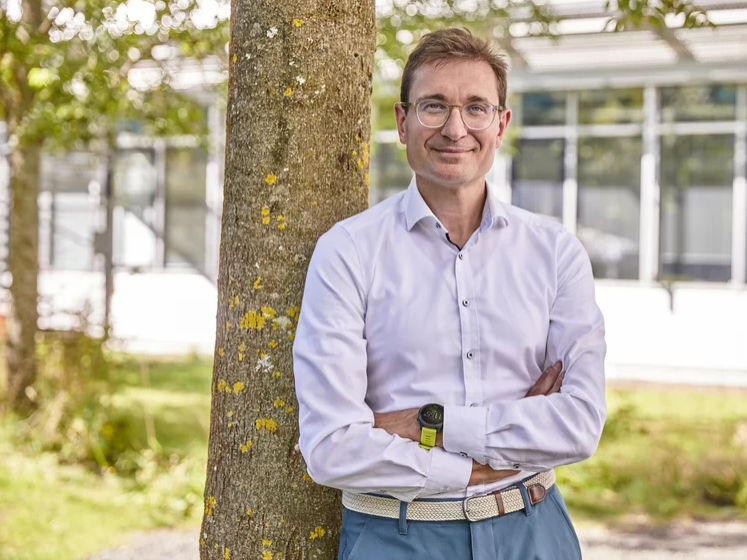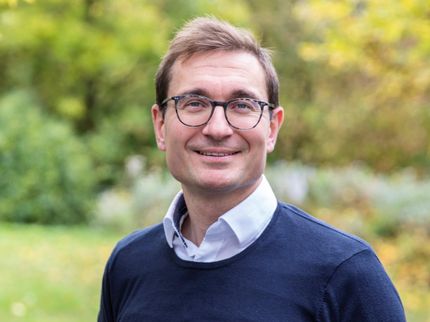Tobias Erb receives the Leibniz Award 2024
Innovative, interdisciplinary research approach opens up new possibilities for developing technologies to address the global climate crisis
Advertisement
Prof. Dr. Tobias Erb, Director at the Max Planck Institute for Terrestrial Microbiology and Professor at the University of Marburg, has been awarded the Gottfried Wilhelm Leibniz Prize by the German Research Foundation (DFG). The Leibniz Prize is the most important research award in Germany and is endowed with 2.5 million euros. With this award, the DFG honors Tobias Erb's pioneering work in the field of synthetic microbiology.

Prof. Dr. Tobias Erb, Director at the Max Planck Institute for Terrestrial Microbiology in Marburg, receives the Leibniz Prize of the German Research Foundation (DFG) 2024.
© Max Planck Institute for Terrestrial Microbiology/Chris Kettner
Tobias Erb's research focuses on the metabolic pathways of microorganisms, especially those involved in the conversion of the greenhouse gas carbon dioxide (CO2). At the interface of molecular biology, biochemistry, and synthetic biology, he studies the structure and function of microbial biocatalysts (enzymes), modifies their properties using synthetic biology methods, and constructs metabolic pathways that have not been created by natural evolution. Tobias Erb uses these pathways in natural and synthetic cells. The innovative, interdisciplinary research approach opens up new possibilities for developing technologies to address the global climate crisis.
"Tobias Erb's work is an example of how novel scientific approaches can help answer questions about the future of humanity," said Marburg University President Professor Dr. Thomas Nauss. "By studying, reconstructing and modifying the CO2 metabolism of microorganisms in detail, Erb's scientific work lays the foundation for understanding the cycle of climate-damaging greenhouse gases. The University of Marburg is proud that Professor Erb is shaping the Marburg science campus as a university professor and member of the Center for Synthetic Microbiology!”
Microorganisms use sunlight or hydrogen to fix CO2 in organic compounds. This allows them to use the problematic greenhouse gas CO2 as a carbon source. With Tobias Erb's synthetic metabolic pathways, CO2 can be extracted from the air in a similar way - but even more efficiently than in nature - and fed into material cycles. Erb and his team recently succeeded in constructing an artificial chloroplast and coupling electric current directly with metabolic conversions to produce the biochemical energy carrier ATP. This could be used to produce valuable materials from simple carbon compounds in a sustainable way. Tobias Erb's research thus opens up far-reaching possibilities for the development of sustainable processes in biotechnology and the capture of CO2 from the atmosphere.
Tobias Erb received his Ph.D. in microbiology from the University of Freiburg in 2009. After research stays in the USA and Switzerland, he became head of the Department of Biochemistry and Synthetic Metabolism in 2014 and director at the Max Planck Institute for Terrestrial Microbiology in 2017. He has also been a professor at the Philipps University of Marburg since 2022. Erb was elected a member of the European Molecular Biology Organization (EMBO) in 2022 and is a member of the German Academy of Natural Scientists Leopoldina since 2023. Tobias Erb was included in the "Talented 12" list of the American Chemical Society in 2015 and received the Heinz-Maier Leibnitz Young Investigator Award of the DFG in 2016. He received the Otto Bayer Prize in 2019, the Jean-Marie Lehn Forcheurs Prize in 2021 and the Merck Future Insight Prize in 2022.
The Gottfried Wilhelm Leibniz Prize has been awarded annually by the DFG since 1986. According to the Ministry of Science, there are three Leibniz Prize winners from Hesse this year, including Prof. Dr. Moritz Helmstaedter from the Max Planck Institute for Brain Research in Frankfurt. The Leibniz Prize is endowed with 2.5 million euros. The money will be used by the researchers over the next seven years to conduct research according to their own ideas.





























































